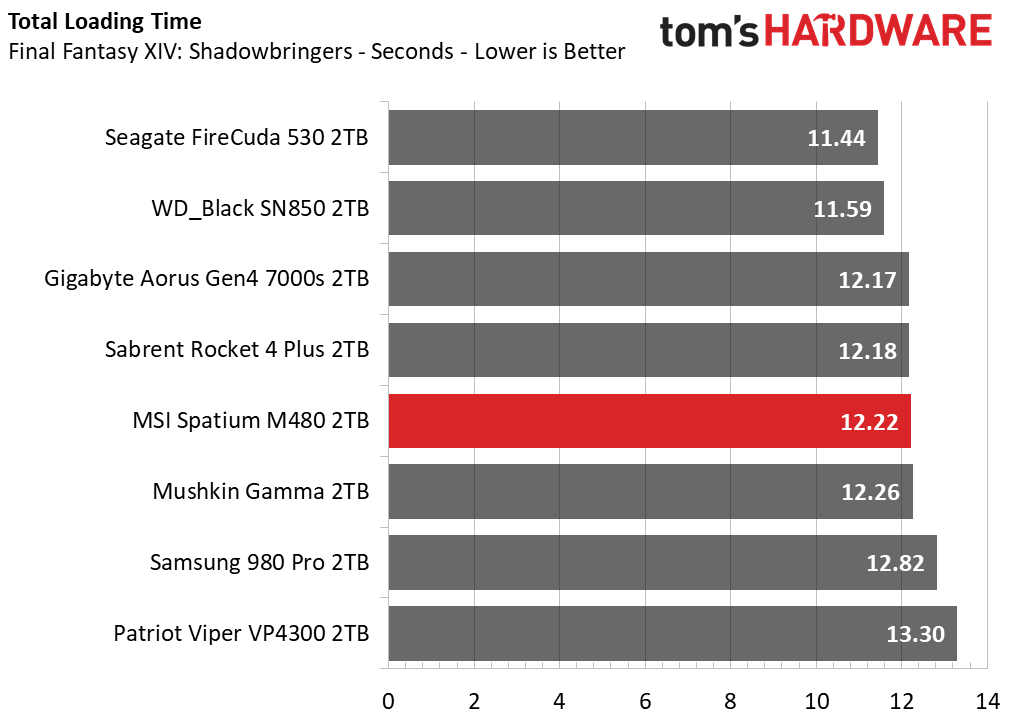Why you can trust Tom's Hardware
Comparison Products
We compare the MSI Spatium M480 here against a few E18-based competitors including the Gigabyte Aorus Gen4 7000s, Sabrent Rocket 4 Plus, Mushkin Gamma, and Seagate's FireCuda 530. We also threw in the WD_Black SN850, Samsung 980 Pro, and Patriot Viper VP4300 for added perspective.
Game Scene Loading - Final Fantasy XIV
Final Fantasy XIV Shadowbringers is a free real-world game benchmark that easily and accurately compares game load times without the inaccuracy of using a stopwatch.
The Spatium M480 delivered a solid load time of 12.22 seconds, but it wasn’t enough to take the win from Seagate’s FireCuda 530, which leverages Micron’s fastest TLC flash yet. MSI's drive also lagged behind the WD_Black SN850. The M480 managed to outperform both Samsung’s 980 Pro and the Patriot Viper VP4300, however.
Transfer Rates – DiskBench
We use the DiskBench storage benchmarking tool to test file transfer performance with a custom dataset. We copy a 50GB dataset including 31,227 files of various types, like pictures, PDFs, and videos to a new folder and then follow-up with a reading test of a newly-written 6.5GB zip file.
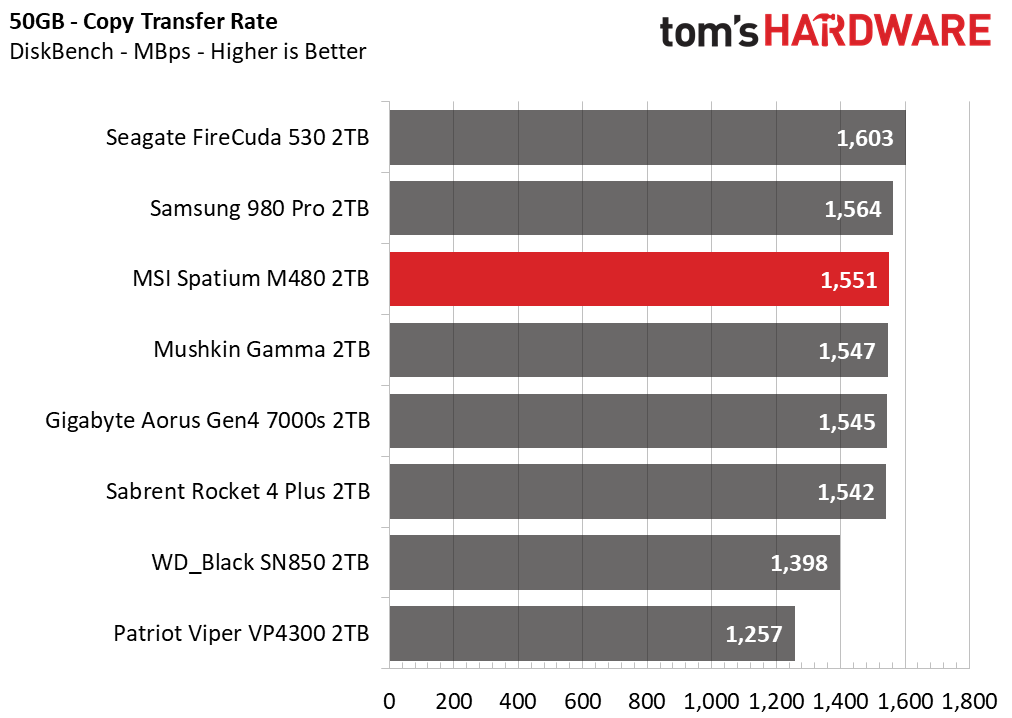
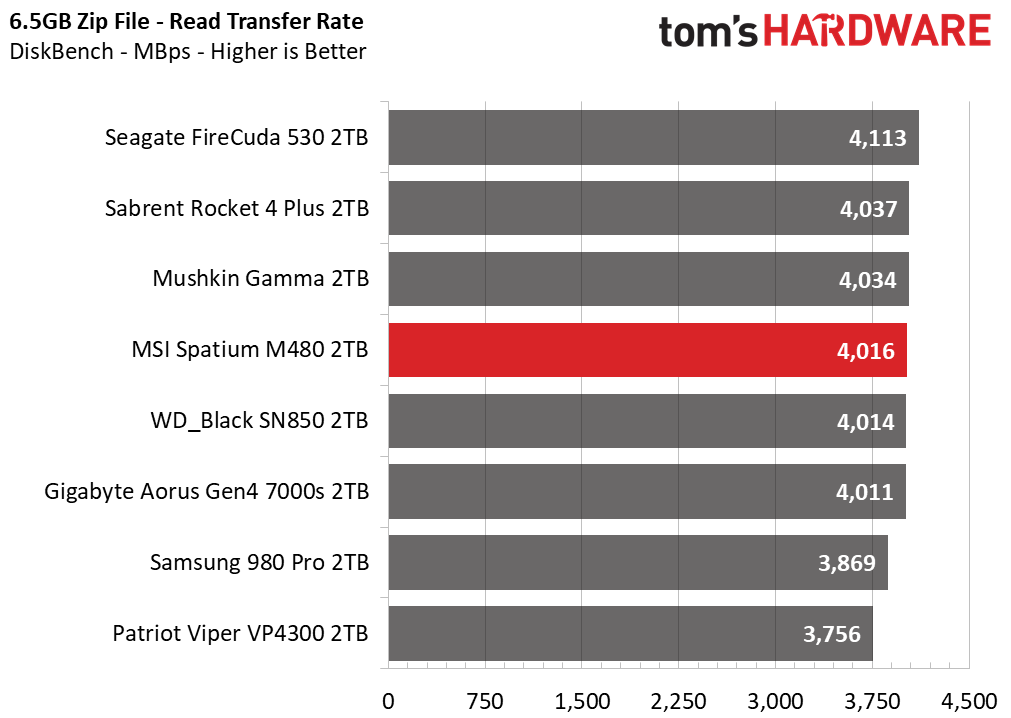
In terms of its file transfer performance, the MSI Spatium M480 delivered fast results that aligned with most of the E18-based competitors. It also scored above that of the WD_Black SN850 and Samsung 980 Pro in the reading portion, but once again the Seagate FireCuda 530 reigned supreme.
Trace Testing – PCMark 10 Storage Test
PCMark 10 is a trace-based benchmark that uses a wide-ranging set of real-world traces from popular applications and everyday tasks to measure the performance of storage devices. The quick benchmark is more relatable to those who use their PCs for leisure or basic office work, while the full benchmark relates more to power users.
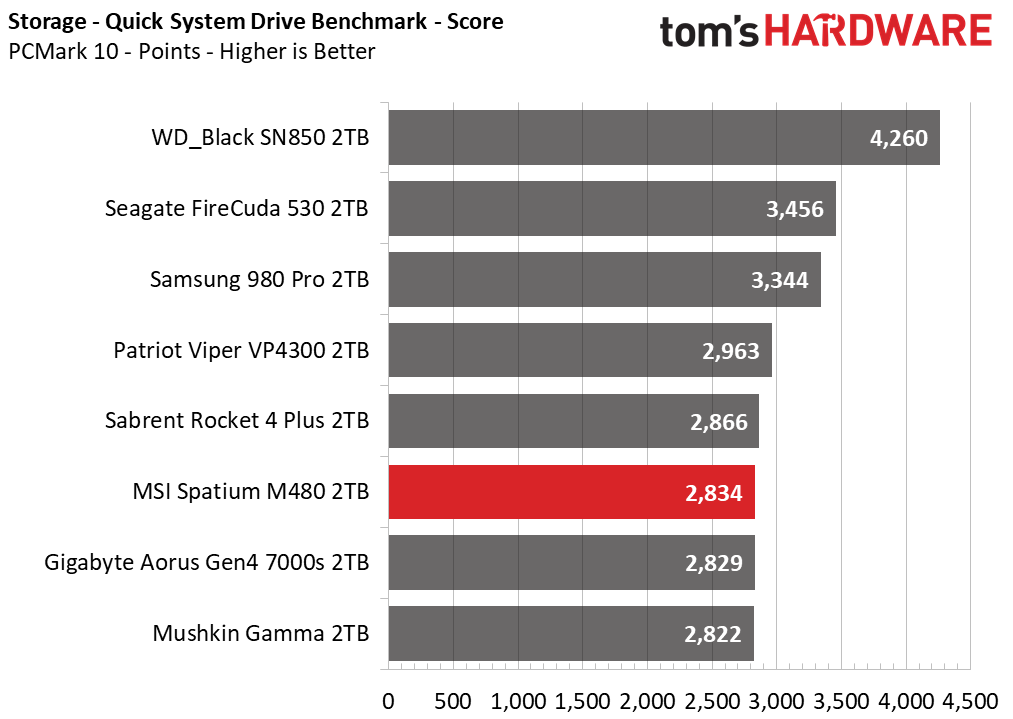
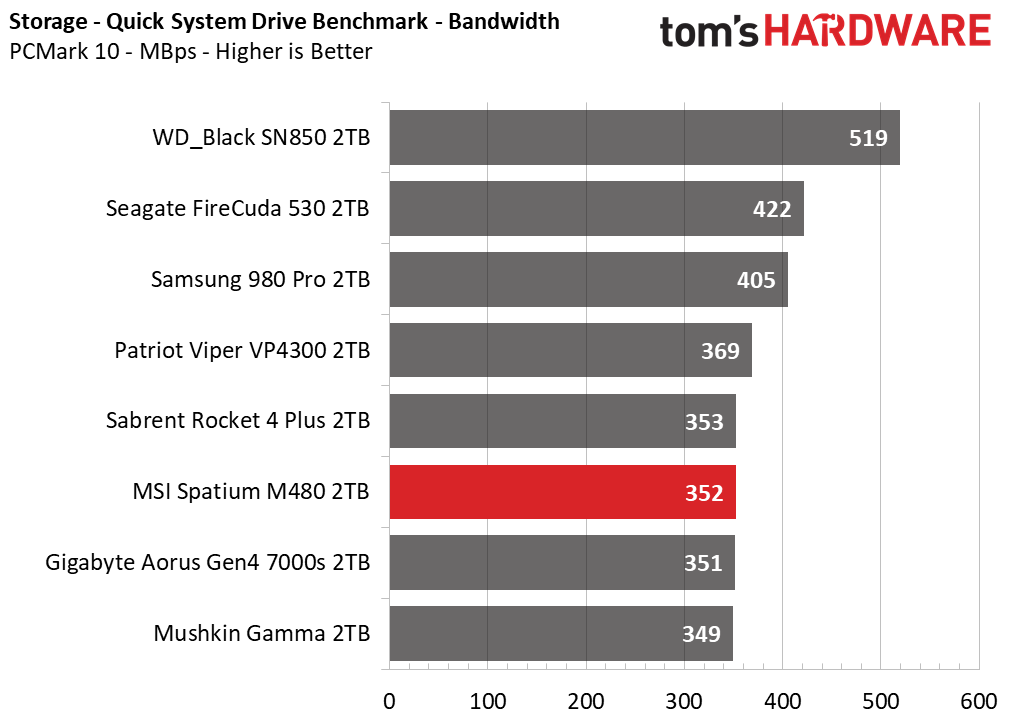
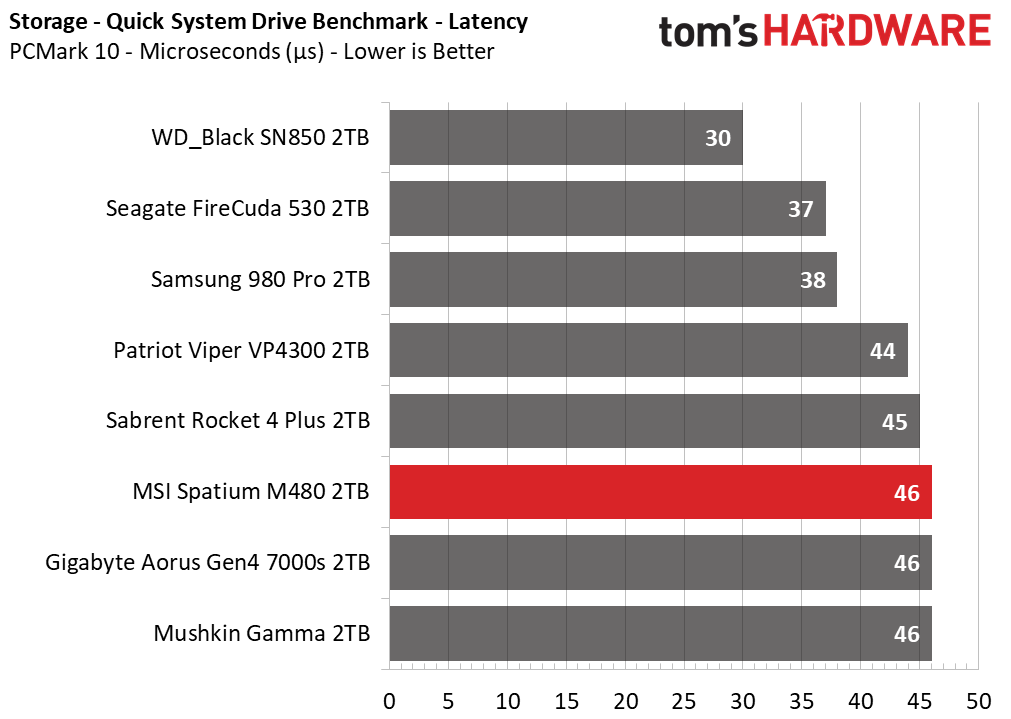
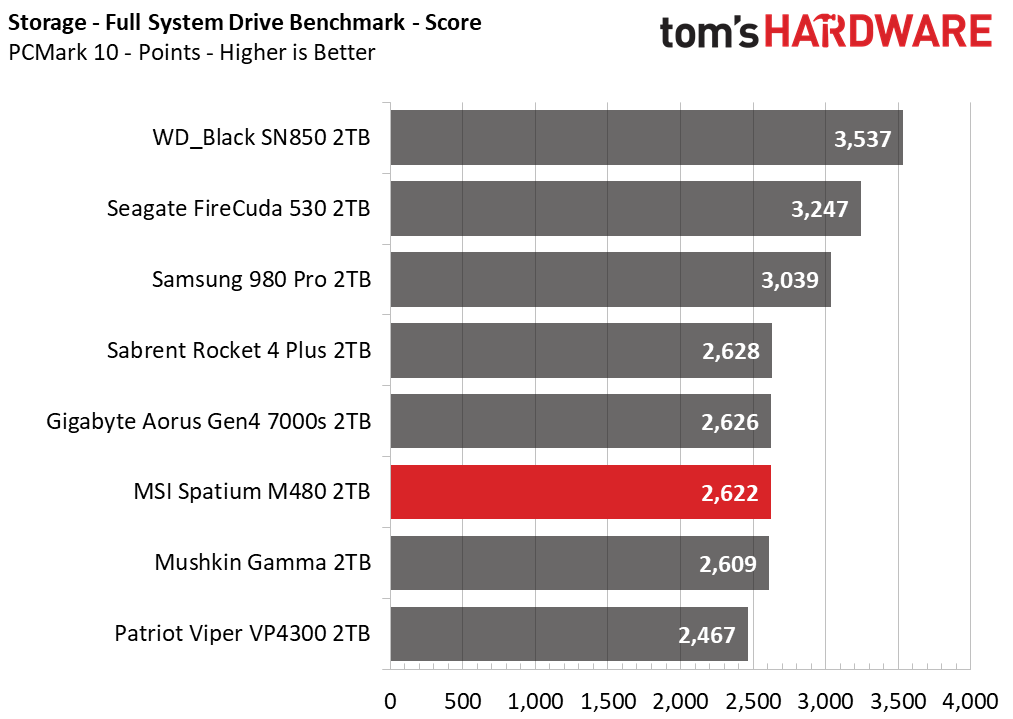
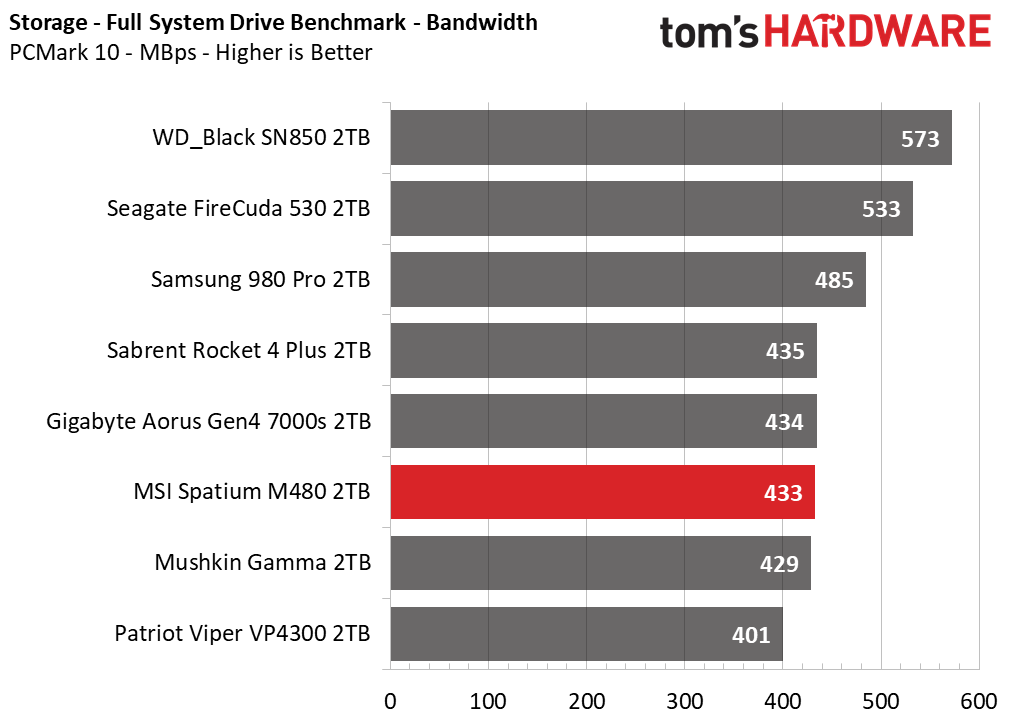
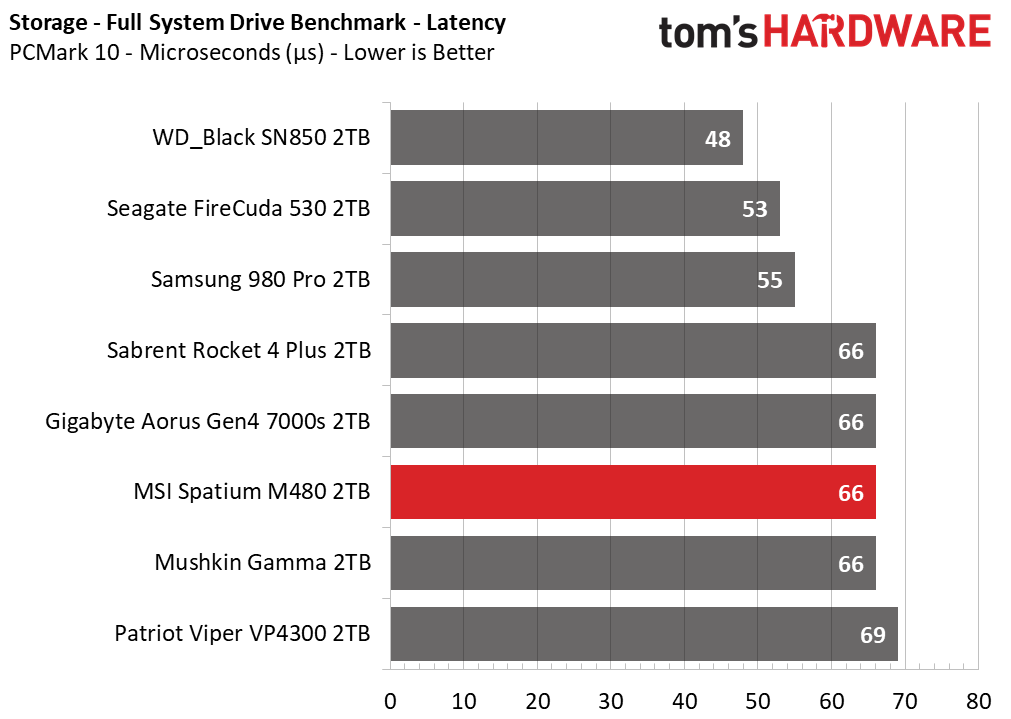
PCMark 10’s results showed that while the MSI Spatium M480 is fast, it isn’t quite as fast as the WD_Black SN850 or Seagate FireCuda 530. The WD_Black SN850 absolutely dominates these application workloads with the Seagate FireCuda 530 hot on its heels. While the M480 was very fast in our previous rounds, it lacked the random performance to serve each application’s request at the highest level.
Get Tom's Hardware's best news and in-depth reviews, straight to your inbox.
Synthetic Testing - ATTO / CrystalDiskMark
ATTO and CrystalDiskMark (CDM) are free and easy-to-use storage benchmarking tools that SSD vendors commonly use to assign performance specifications to their products. Both of these tools give us insight into how each device handles different file sizes.
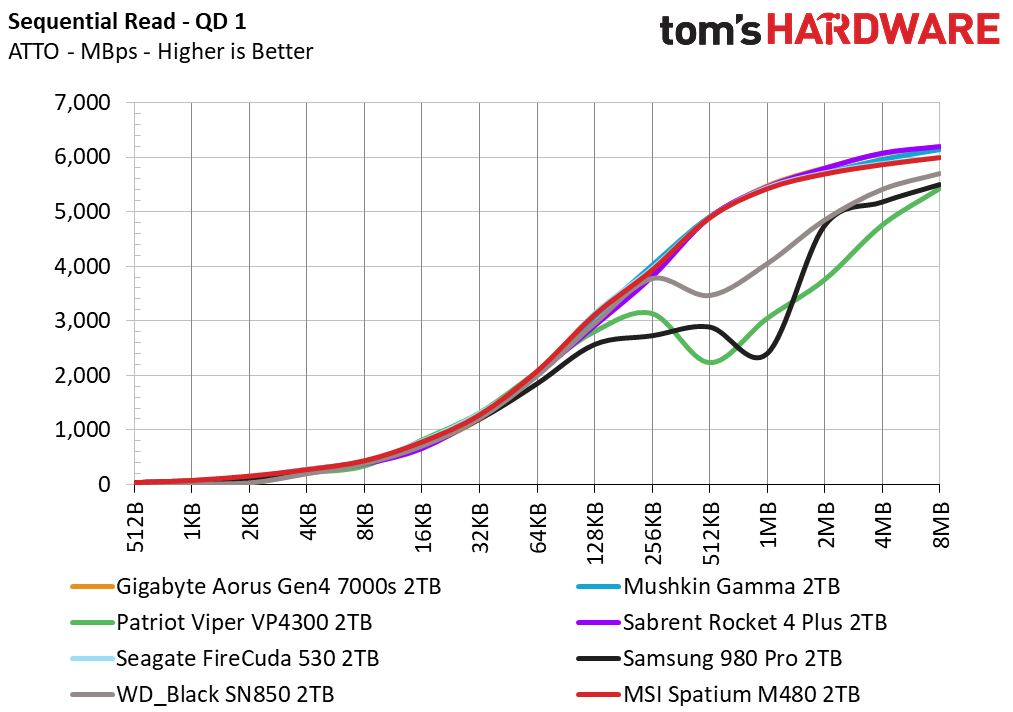
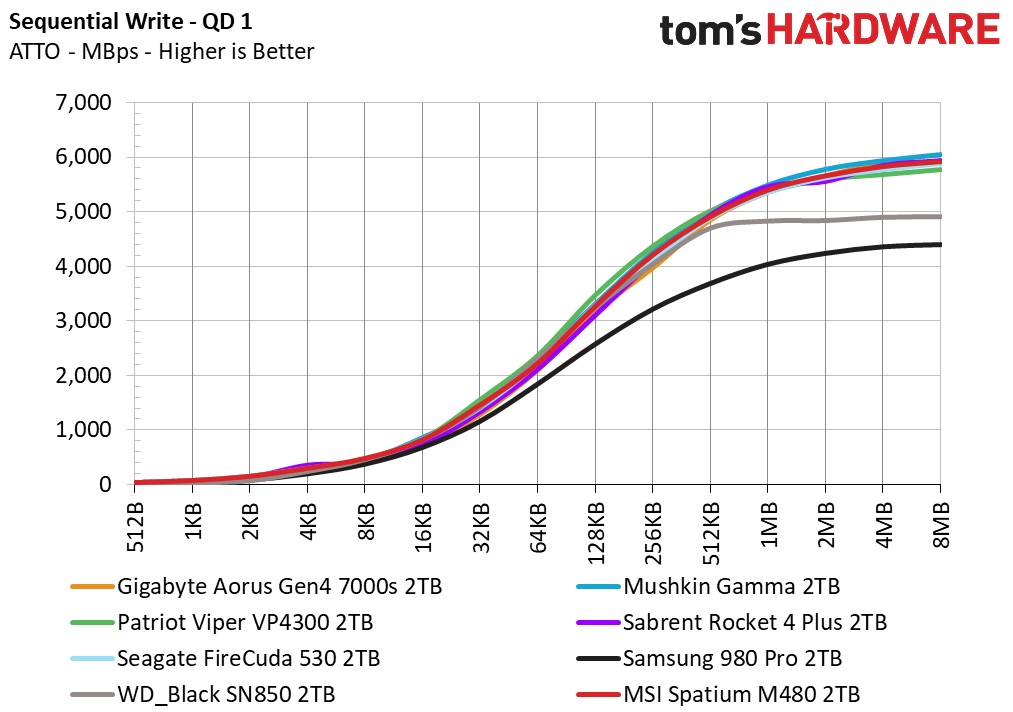
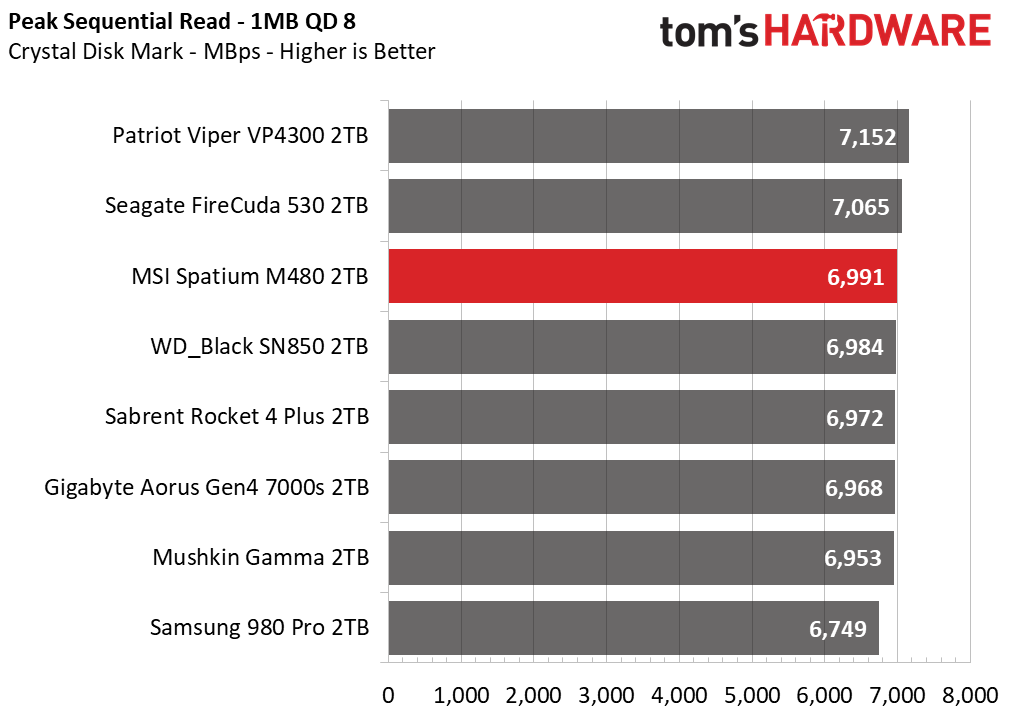
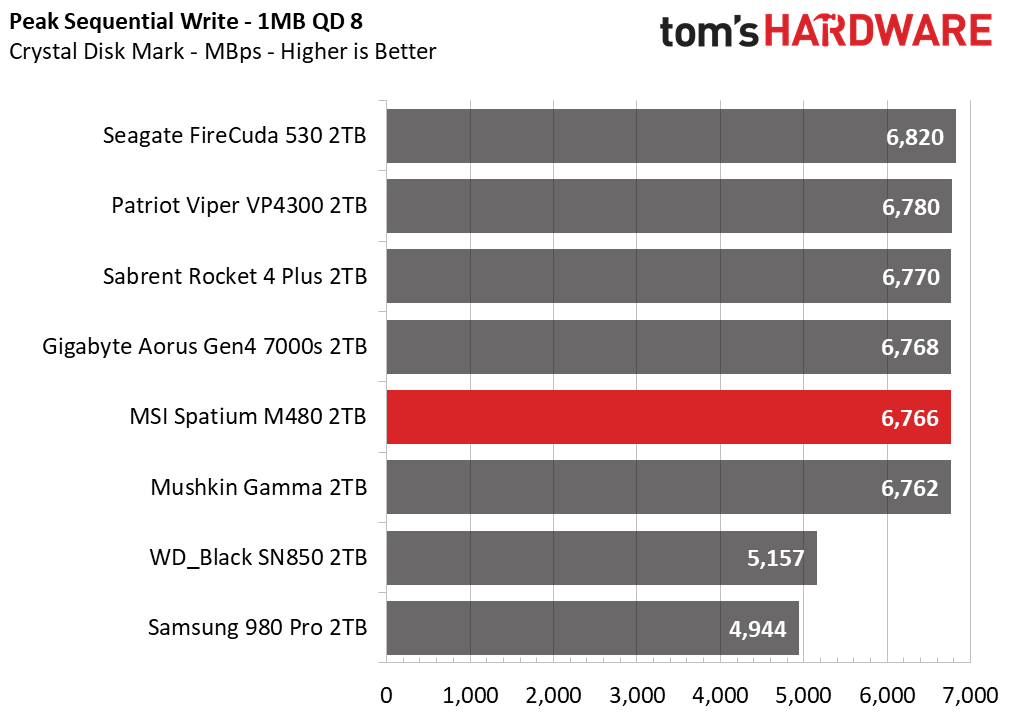
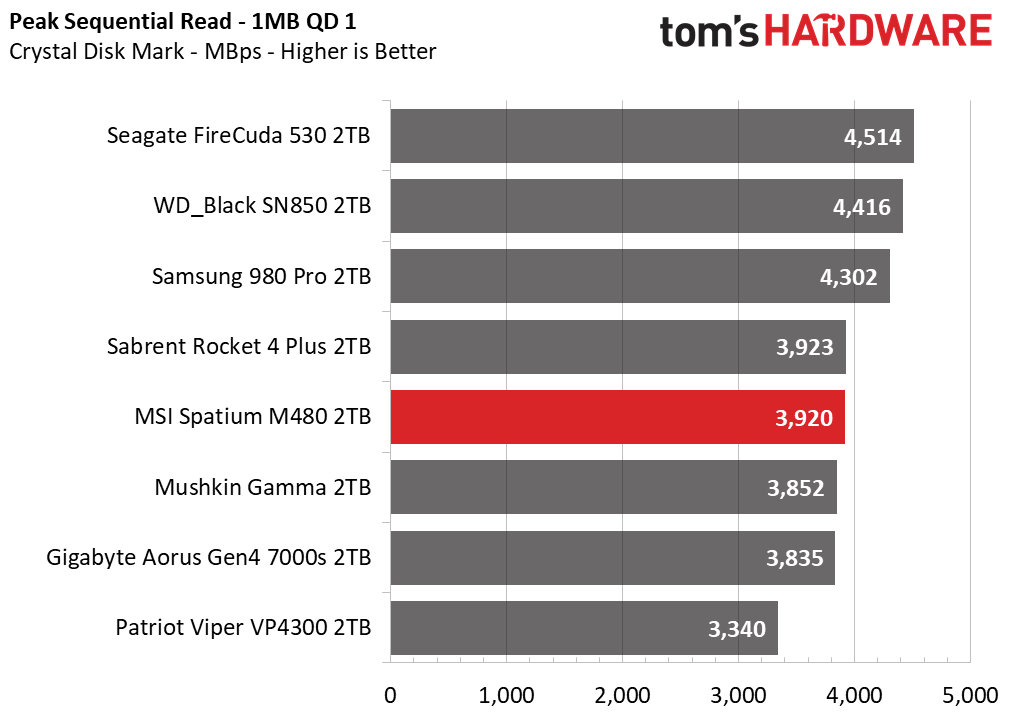
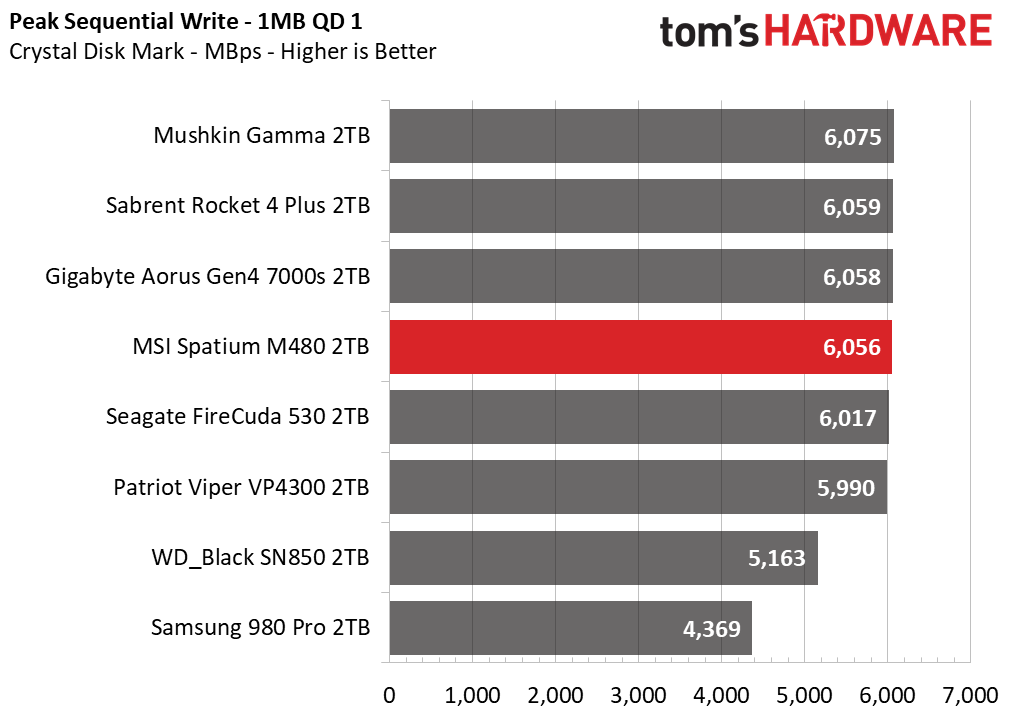
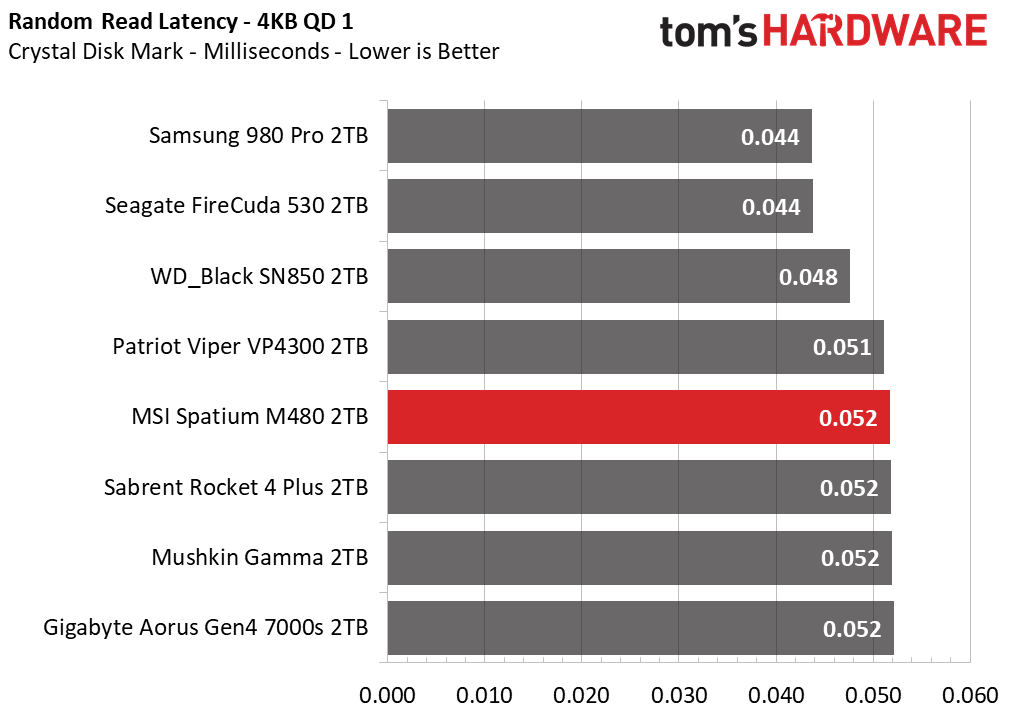
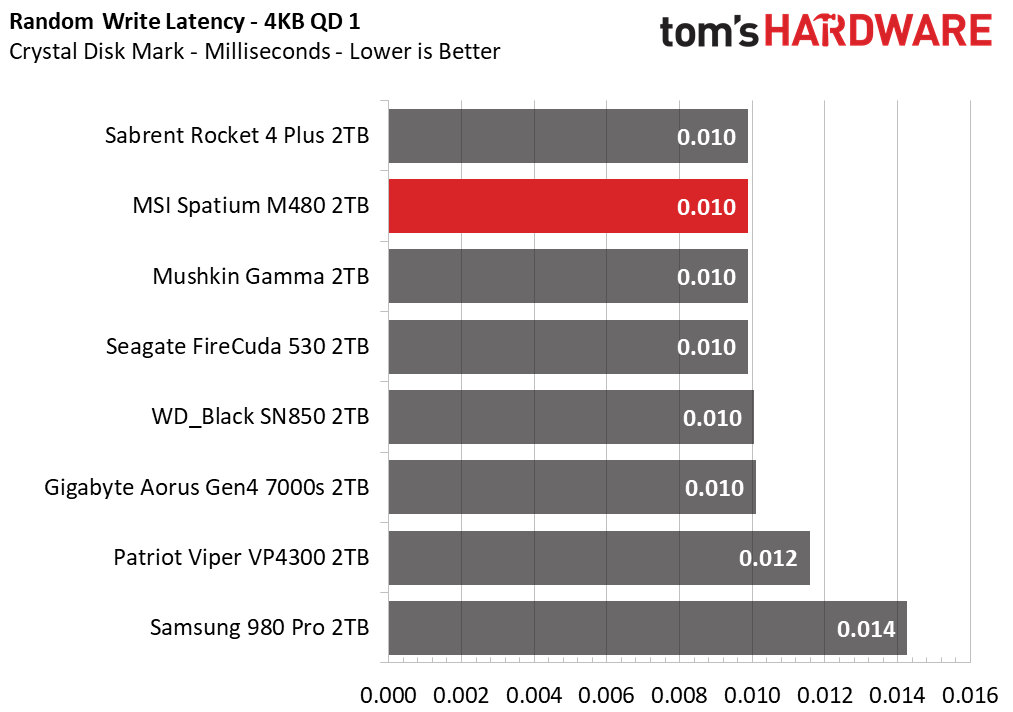
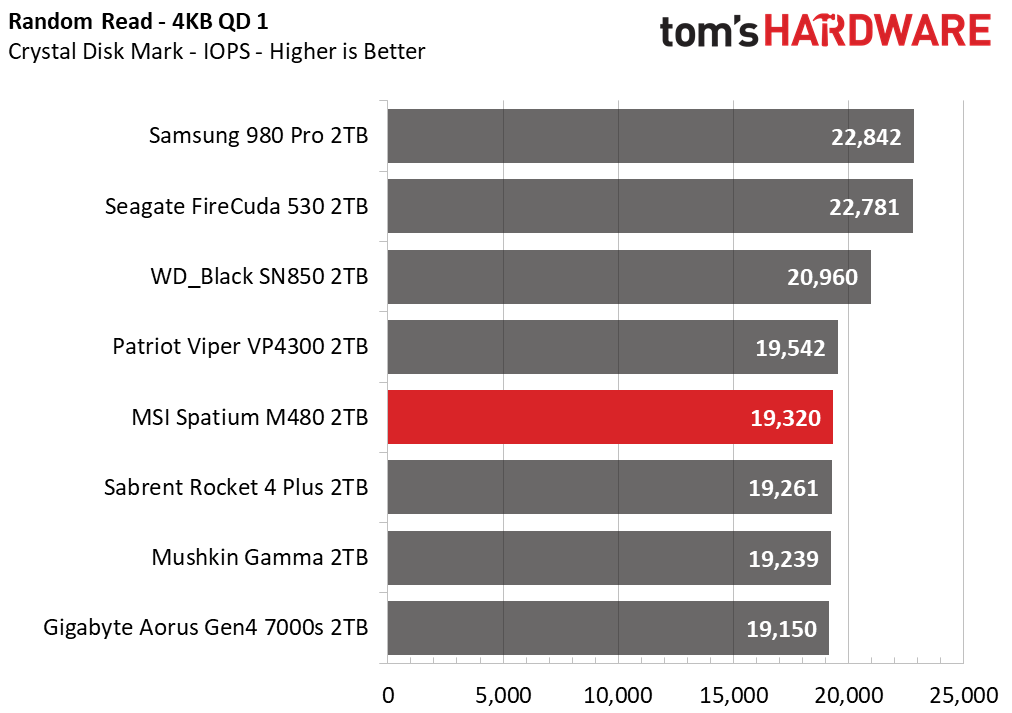
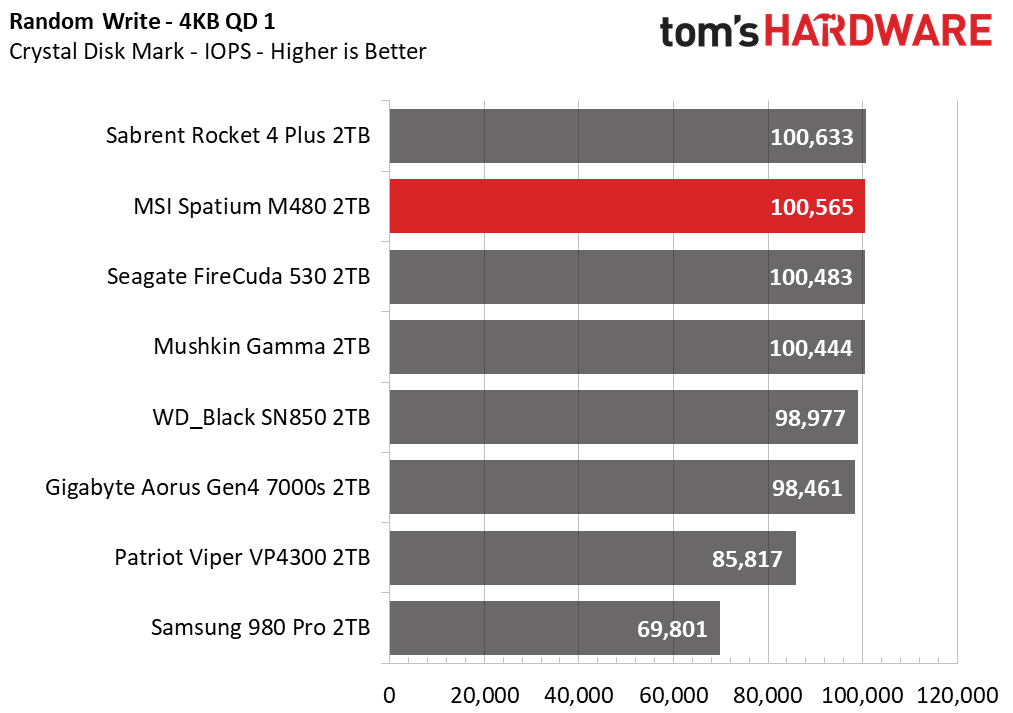
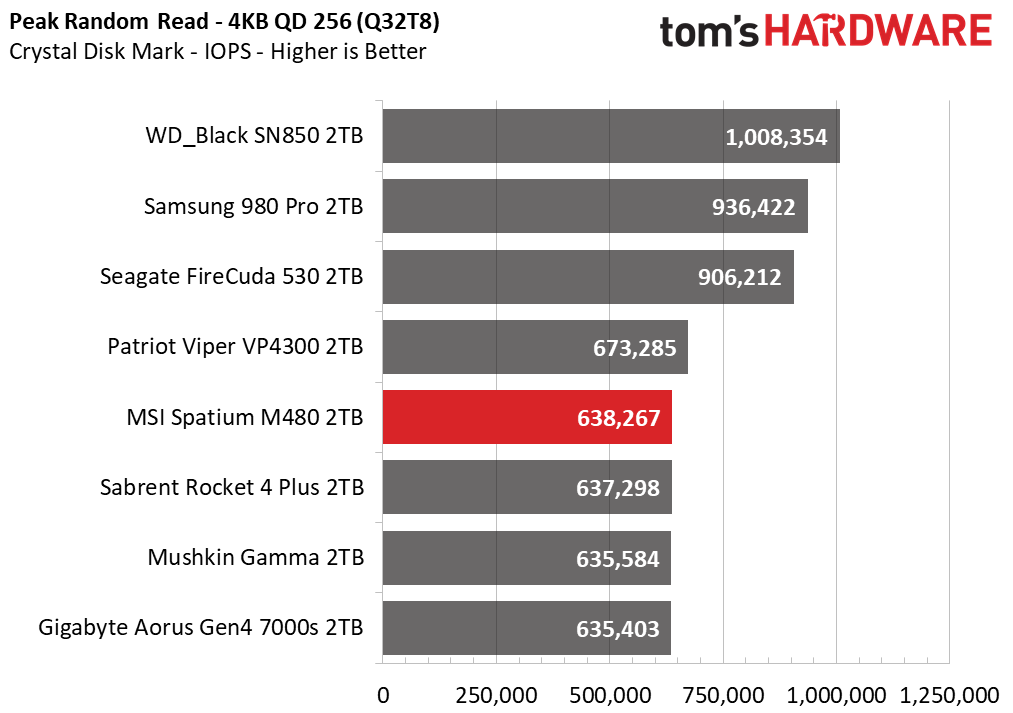
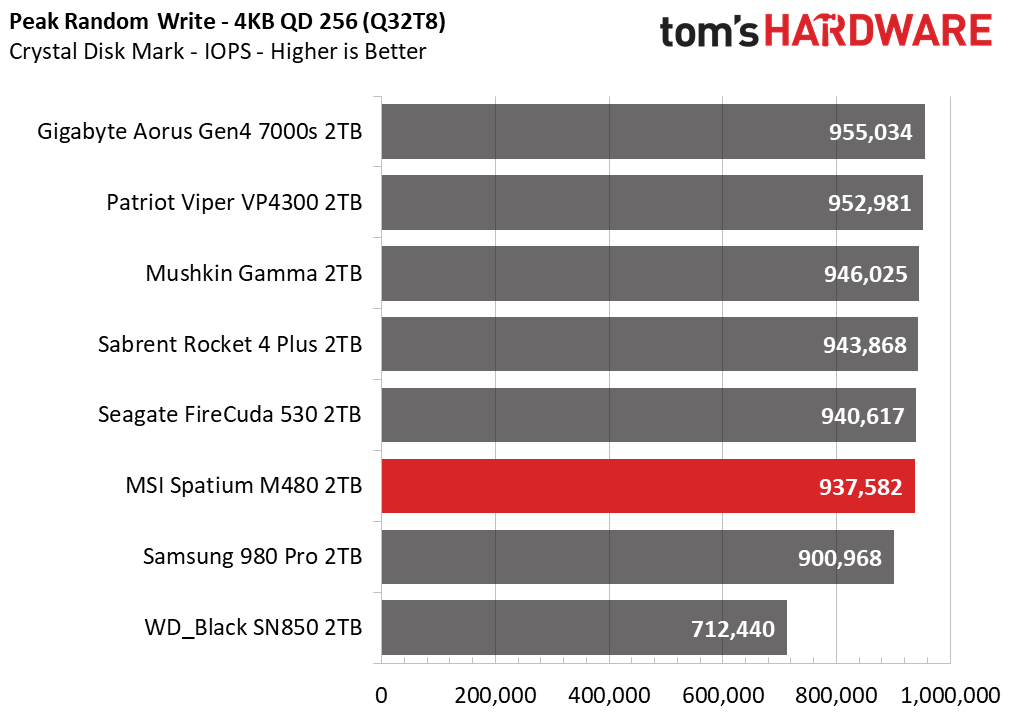
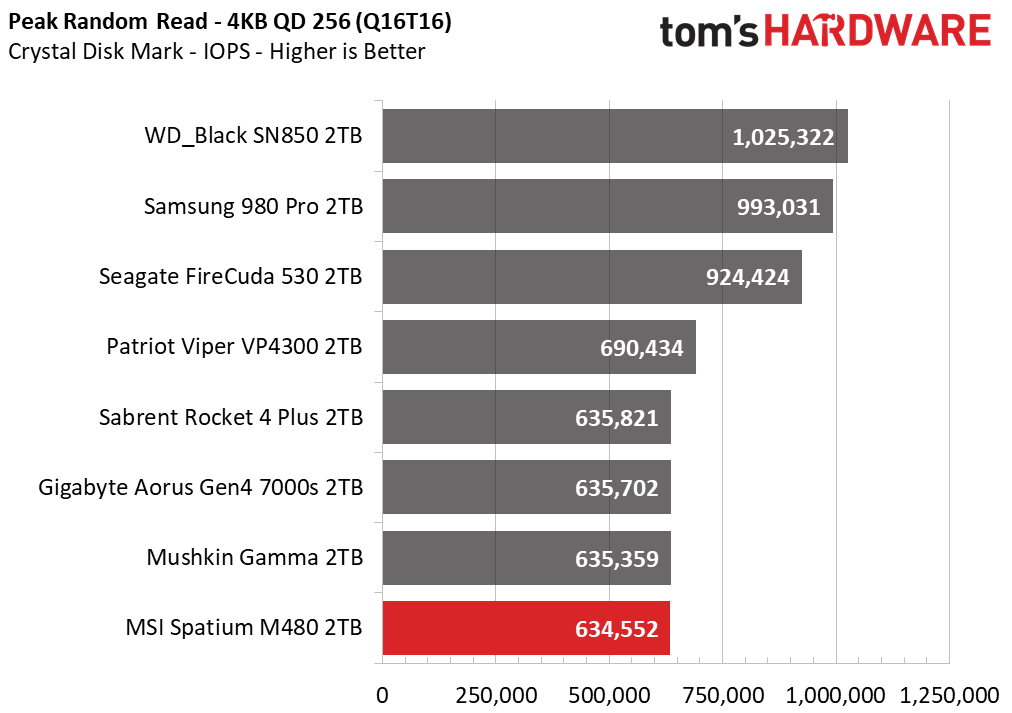
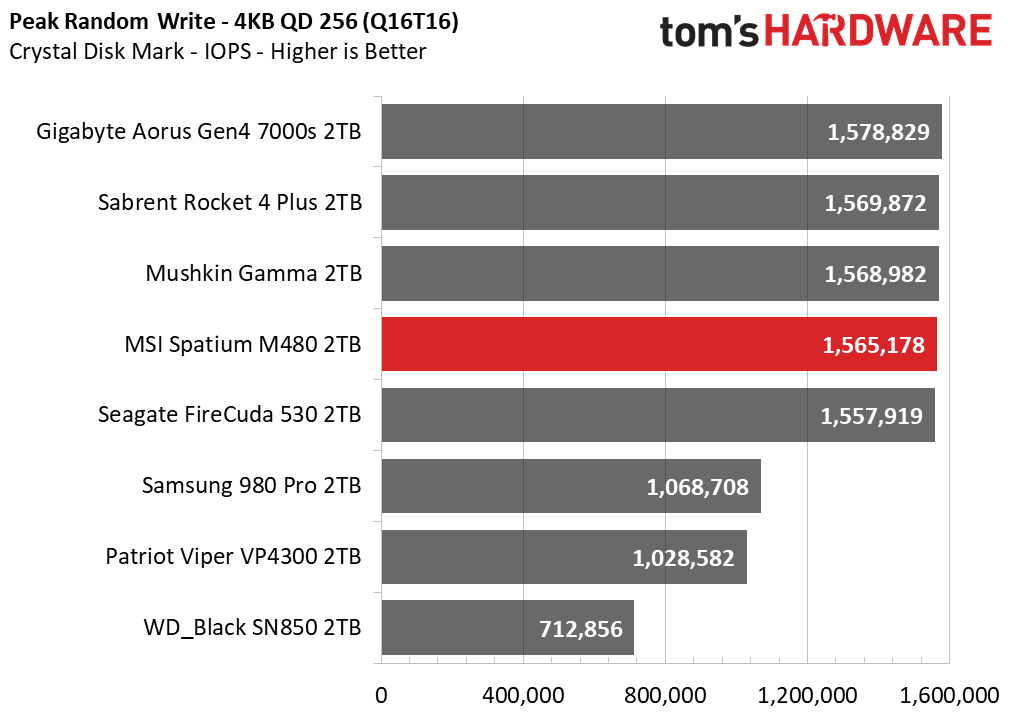
The MSI Spatium M480’s sequential performance ramped up nicely when testing it against various block sizes based on its performance in ATTO. However, Crystal Disk Mark’s sequential QD1 performance showed room for improvement. Random read performance could use improvement too. While the M480 scored a fast random response time of just 0.052, both the Seagate FireCuda 530 and Samsung 980 Pro show the MSI up by responding roughly 20% faster.
Sustained Write Performance and Cache Recovery
Official write specifications are only part of the performance picture. Most SSDs implement a write cache, which is a fast area of (usually) pseudo-SLC programmed flash that absorbs incoming data. Sustained write speeds can suffer tremendously once the workload spills outside of the cache and into the "native" TLC or QLC flash. We use iometer to hammer the SSD with sequential writes for 15 minutes to measure both the size of the write cache and performance after the cache is saturated. We also monitor cache recovery via multiple idle rounds.
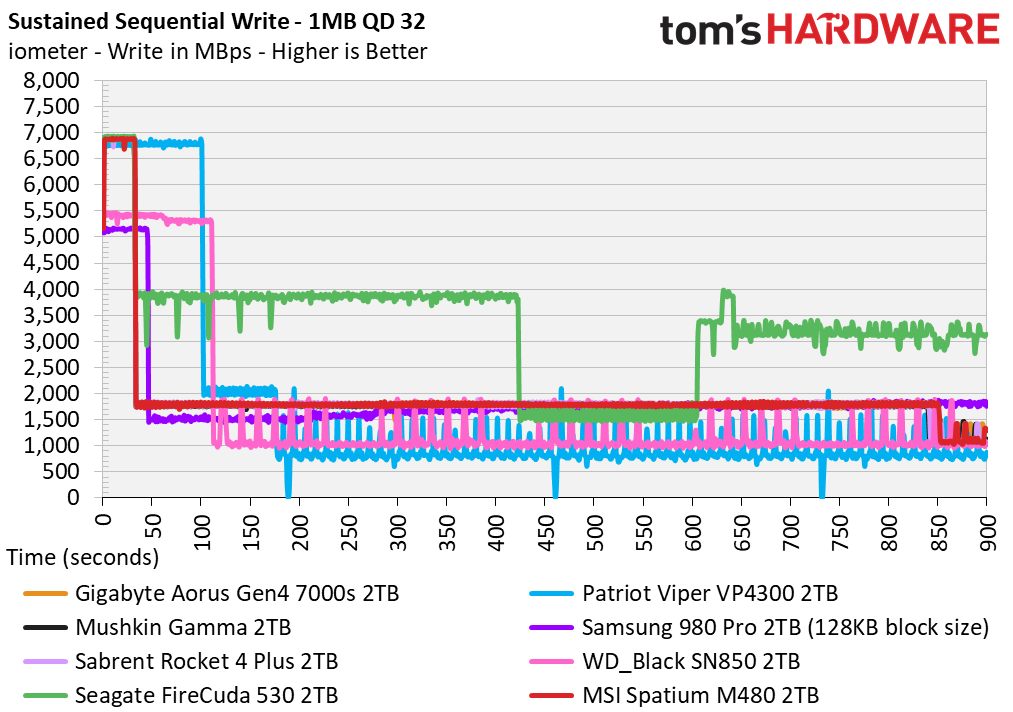
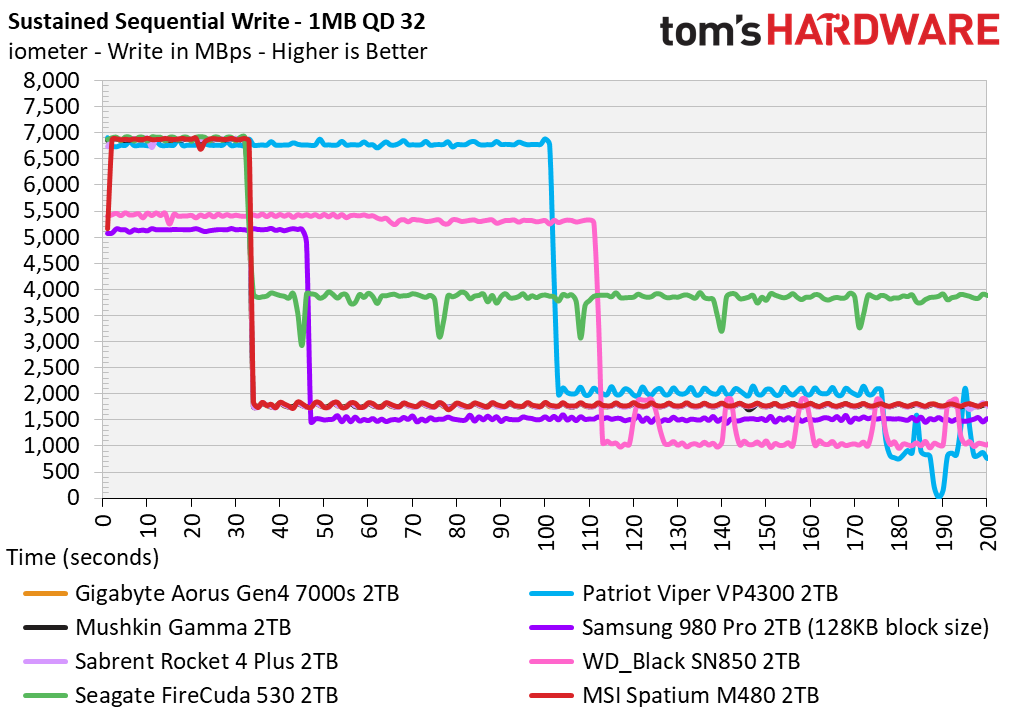
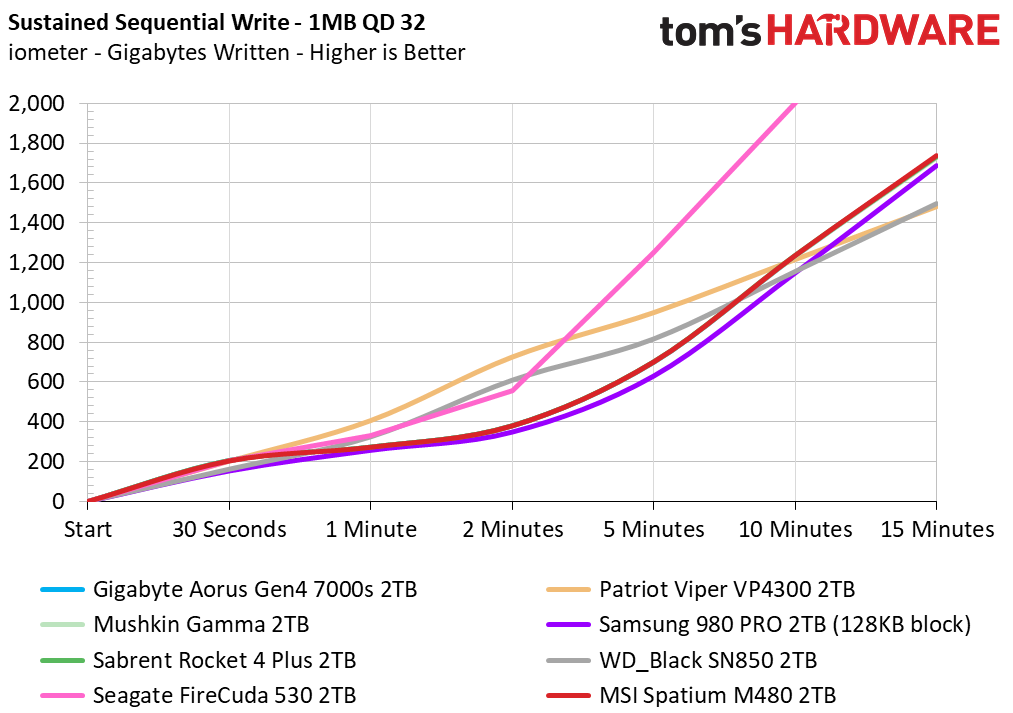
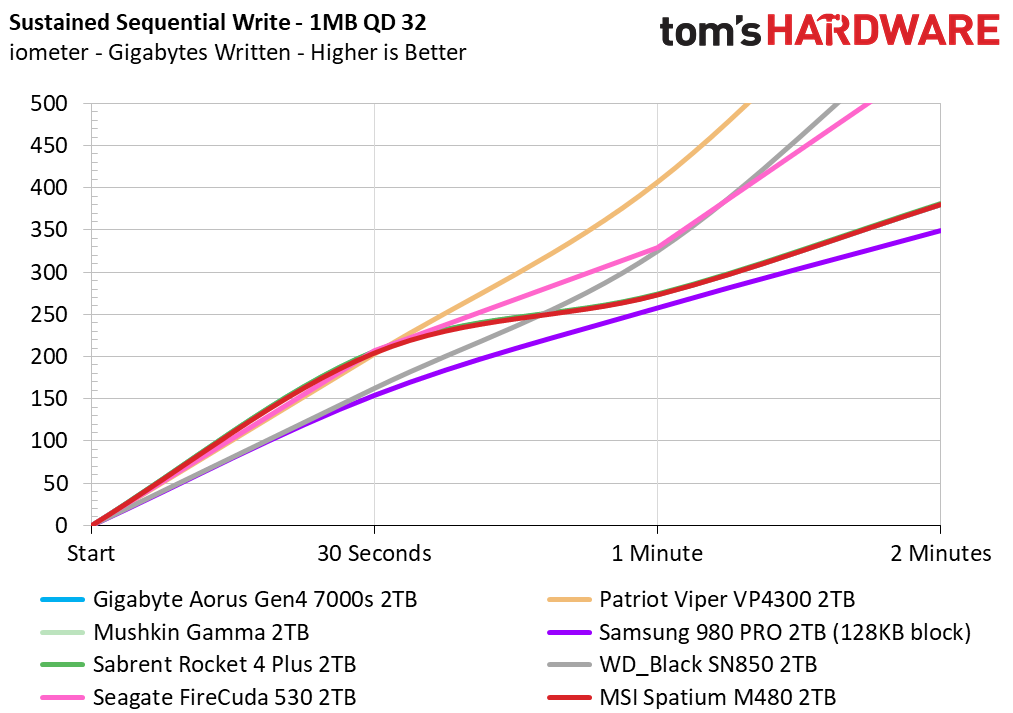
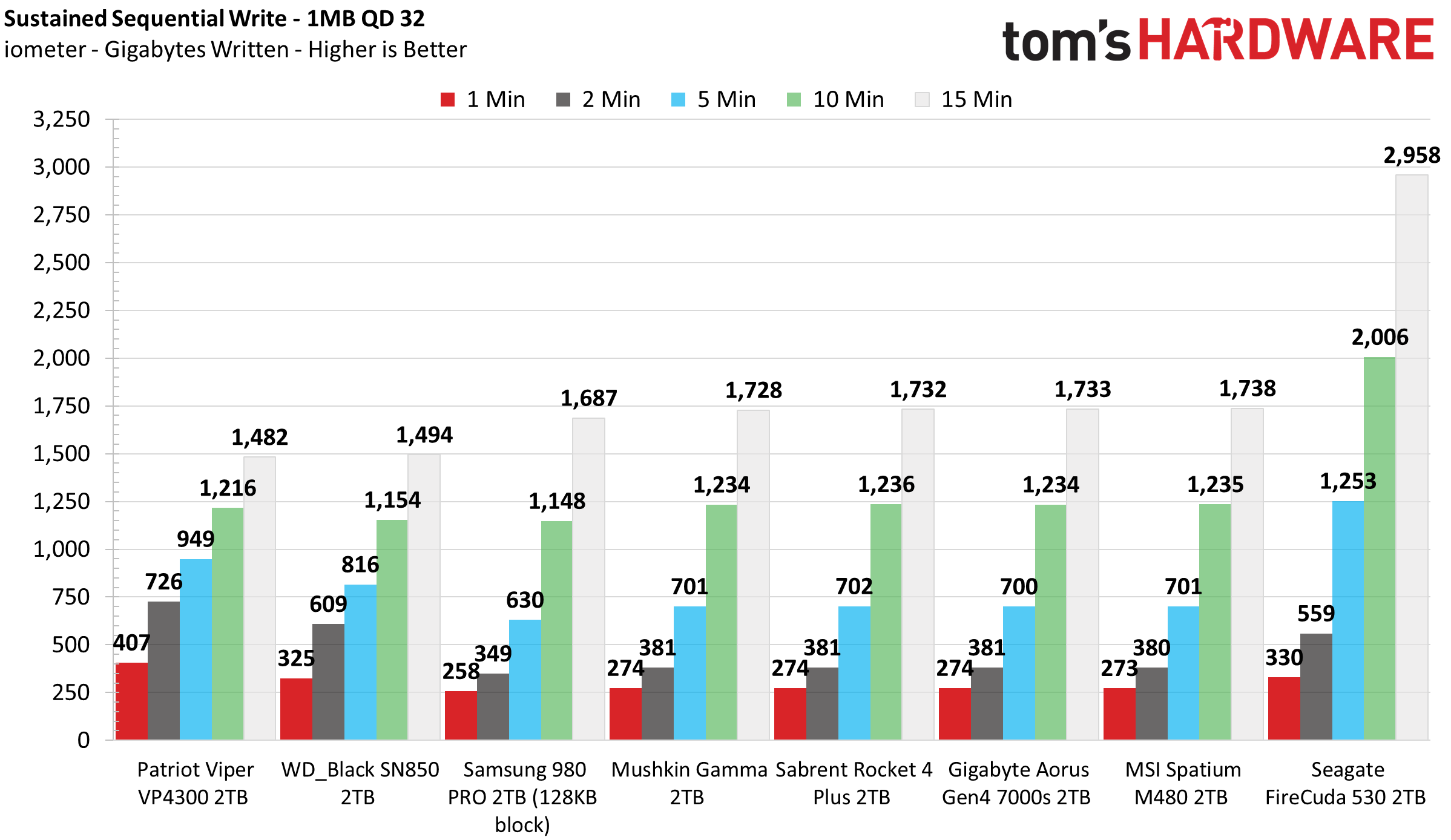
MSI’s Spatium M480 wrote 225GB at an average rate of roughly 6.9 GBps before its performance degraded. Once degraded, it wrote at 1.8 GBps for an additional 1.45TB, before it degraded once more to an average write speed of 1.1GBps for the remainder of the test. In terms of recovery, the Spatium could use some refinement, as it does not recover any of its caches even after 30 minutes of idle.
Power Consumption and Temperature
We use the Quarch HD Programmable Power Module to gain a deeper understanding of power characteristics. Idle power consumption is an important aspect to consider, especially if you're looking for a laptop upgrade. Some SSDs can consume watts of power at idle while better-suited ones sip just milliwatts. Average workload power consumption and max consumption are two other aspects of power consumption, but performance-per-watt is more important. A drive might consume more power during any given workload, but accomplishing a task faster allows the drive to drop into an idle state more quickly, ultimately saving energy.
We also monitor the drive’s temperature via the S.M.A.R.T. data and an IR thermometer to see when (or if) thermal throttling kicks in and how it impacts performance. Bear in mind that results will vary based on the workload and ambient air temperature.
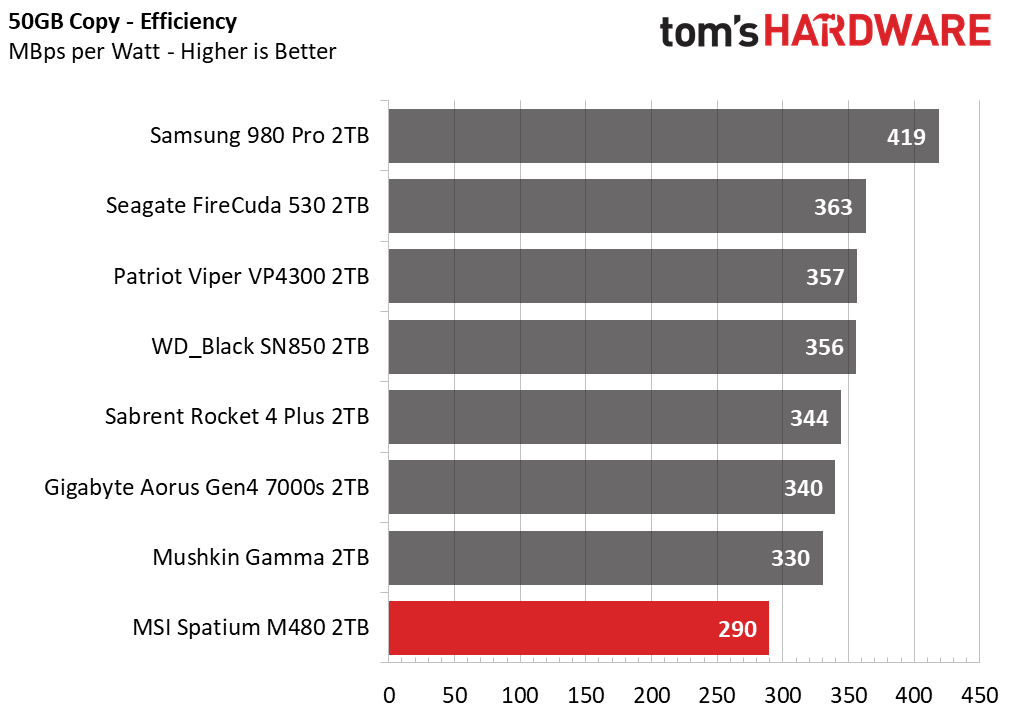
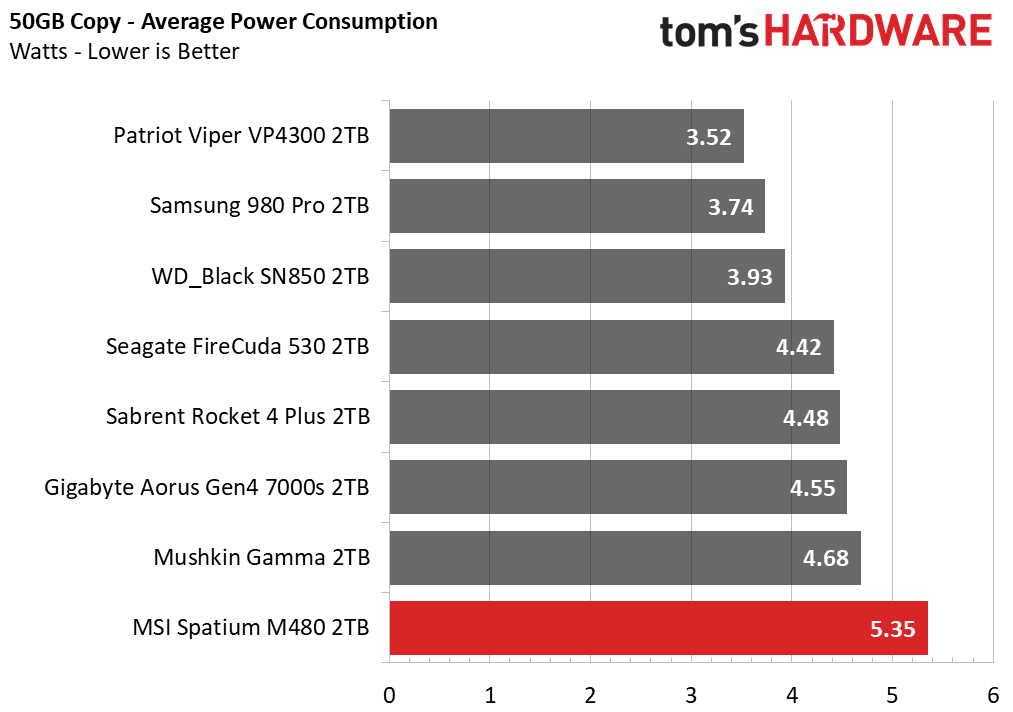
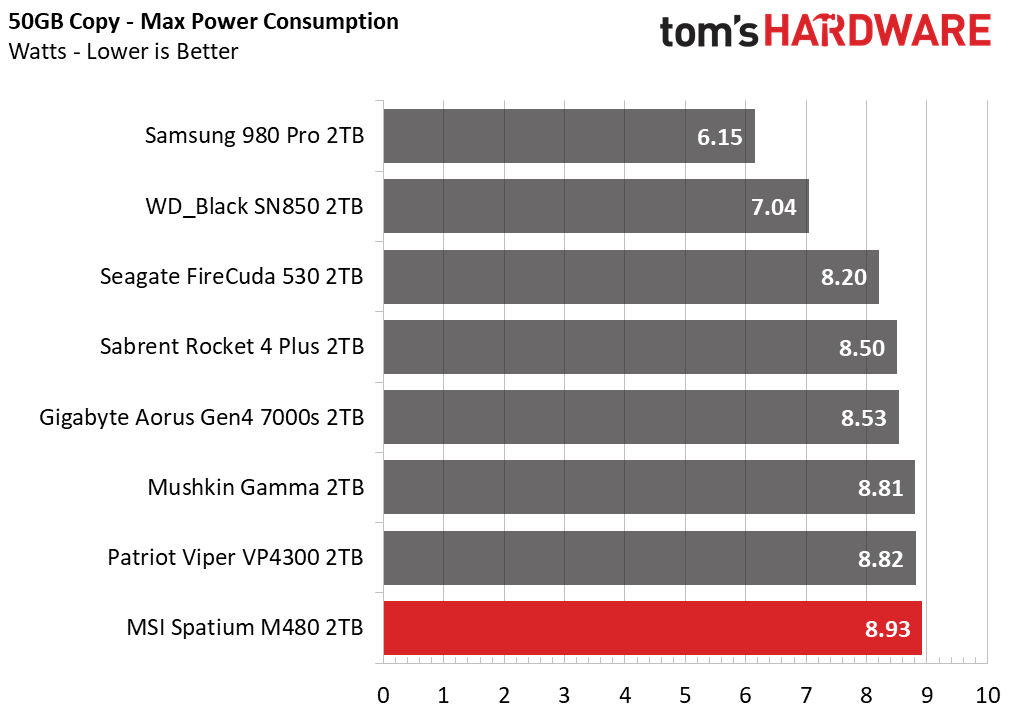
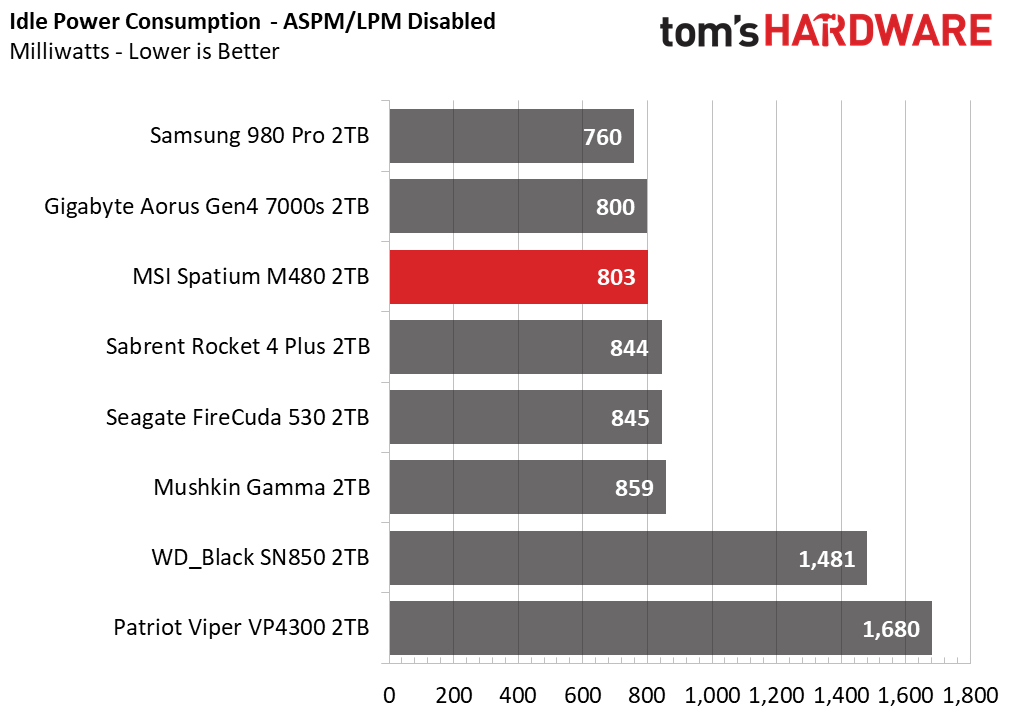
MSI’s Spatium M480 proved rather inefficient compared to what we were expecting. Instead of consuming similar power to that of its E18 brethren, the M480 consumed roughly 0.75W more power than average, and scored the highest peak power consumption score in the bunch, bordering 9W. This set it up for a last-place ranking on our efficiency chart.
While the Spatium M480 was less efficient, it still managed to deliver throttle-free performance without the heatsink. At idle, S.M.A.R.T. data reported a reading of 36 degrees Celsius while our thermal gun measured the controller at 51 degrees Celsius. After transferring roughly 600GB to and from the M480, its maximum S.M.A.R.T. data reported temperature reached only 64 degrees Celsius. However, in measuring the controller with a thermal gun at that point, we found the it was operating at temperatures of roughly 85 degrees Celsius.
Test Bench and Testing Notes
| CPU | Intel Core i9-11900K |
| Motherboard | ASRock Z590 Taichi |
| Memory | 2x8GB Kingston HyperX Predator DDR4 5333 |
| Graphics | Intel UHD Graphics 750 |
| CPU Cooling | Alphacool Eissturm Hurricane Copper 45 3x140mm |
| Case | Streacom BC1 Open Benchtable |
| Supply | Corsair SF750 Platinum |
| OS Storage | WD Black SN850 2TB |
| Operating System | Windows 10 Pro 64-bit 20H2 |
We use a Rocket Lake platform with most background applications such as indexing, windows updates, and anti-virus disabled in the OS to reduce run-to-run variability. Each SSD is prefilled to 50% capacity and tested as a secondary device. Unless noted, we use active cooling for all SSDs.
Conclusion
MSI’s Spatium M480 delivered solid performance that is up there with some of the fastest NVMe SSDs available. It’s not quite as fast as the new Seagate FireCuda 530, with all of its glorious Micron 176L B47R TLC. But even with just 96L B27B TLC, it put up a good fight in most tests--that is until it came to testing out its efficiency and sustained write speed.
Strangely, while MSI’s Spatium M480 performed similarly enough to its competitors, its efficiency results pointed to it being very power-hungry in comparison to other E18 and B27B combos like the Sabrent Rocket 4 Plus or Gigabyte Aorus Gen4 7000s. And, compared to the Seagate FireCuda 530, the M480’s sustained write performance, while solid for what it is, comes nowhere near close to the speeds the Seagate drive can sustain.
While slower than the Seagate FireCuda 530, MSI's drive is also much cheaper, although not as cheap as some of its competition. The MSI Spatium commands a premium with its classy but large bronze-colored heatsink and AES 256-bit encryption support. With its heatsink, the Spatium M480 is nearly guaranteed to remain cool under any workload. That said, from our testing, it also proved to operate throttle-free even without it. So, if you don’t care much for the aesthetic appeal, the non-heatsink model should prove just fine and you can save a few bucks.
The Spatium M480 isn’t quite as affordable as the WD_Black SN850 nor Samsung's 980 Pro, which is a bit off-putting, especially considering the cost difference between these SSDs is so large. Both the Samsung and WD Black list at $370 for the 2TB models, while the MSI lists at $435 without the heatsink or $445 with the heatsink. We don’t believe the MSI Spatium M480 is worth the $65-$75 premium over the Samsung or WD drives. Additionally, while it doesn’t come with a heatsink, Mushkin’s Gamma offers a better value, currently listed at $350. But if you catch the Spatium M480 on sale at a comparable price, or just absolutely love its looks, then it's well worth picking up. Its combination of speed and attractive looks are tough to beat.
MORE: Best SSDs
MORE: How We Test HDDs And SSDs
MORE: All SSD Content

Sean is a Contributing Editor at Tom’s Hardware US, covering storage hardware.
-
Sleepy_Hollowed It's an OK SSD if found for that price, but this may be me talking from the scalping going on.Reply
It would do OK for gaming and home user loads, but definitively not a caching solution if you do lots of big transfers.
For those enterprise SSDs are probably a lot better, especially for photographers that do lots of random sustained IO.
I'm a big amused at the size of heatsinks these days though, although I appreciate them, especially in cramped cases.
